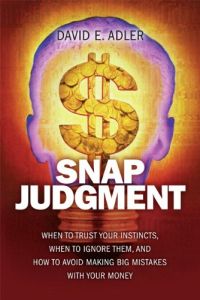Join getAbstract to access the summary!

Join getAbstract to access the summary!
David E. Adler
Snap Judgment
When to Trust Your Instincts, When to Ignore Them, and How to Avoid Making Big Mistakes with Your Money
FT Press, 2009
What's inside?
Are gut feelings the best way to pick a stock, a house or a racehorse? Think so? Think again. Why analysis beats instinct.
Recommendation
From CEOs to private investors, people tend to place far too much emphasis on their own instincts when making decisions, even though the results are often disastrous. Behavioral economist David E. Adler examines why people make life-altering decisions based on intuition, habit, gut feelings, urges or snap judgments instead of using analytical reasoning, a far better tool for complex decision making. In this absorbing, eminently readable book, Adler offers many fascinating case histories that demonstrate the dangers of intuitive thinking. After weighing the evidence carefully, getAbstract finds that investors, managers and other decision makers will certainly benefit from reading his report.
Summary
About the Author
David E. Adler writes for Financial Planning, and has been published in The New Republic, Barron’s and Psychology Today. He is studying wealth managers’ tax awareness under a Chartered Financial Analysts Institute Research Foundation grant.

















Comment on this summary